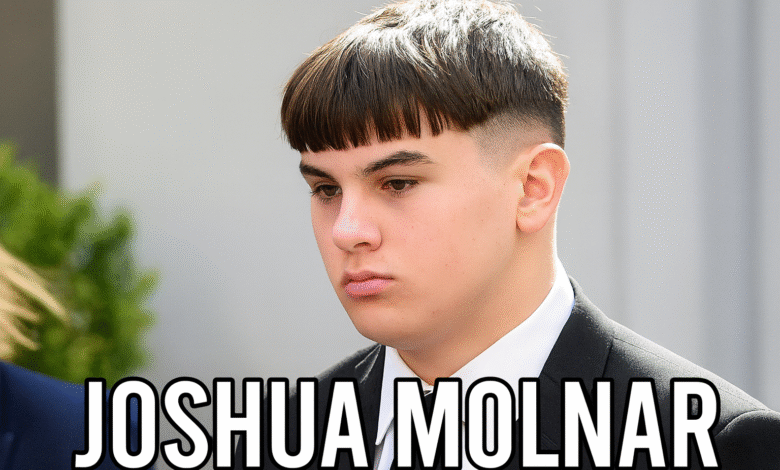Joshua Molnar: The Acquittal, the Inquest, and the Ongoing Questions Surrounding a Controversial Case
How a high-profile trial and later inquest painted contrasting pictures of a tragic night

Introduction
The name Joshua Molnar became widely known in the UK following the fatal stabbing of his friend, 17-year-old Yousef Makki, in March 2019. The incident occurred in the affluent area of Hale Barns, Cheshire, and quickly drew national attention due to its complex mix of legal arguments, social context, and the backgrounds of those involved. While a jury later acquitted Molnar of murder and manslaughter, subsequent legal proceedings and a second inquest cast the events of that evening in a very different light.
The story has since become a focal point for debates about justice, self-defence, and how socioeconomic status can influence public perception. Molnar’s case is both a tale of a legal victory and a moral controversy, with the verdicts and inquest findings prompting ongoing discussion.
Quick Bio
| Attribute | Detail |
|---|---|
| Full Name | Joshua Molnar |
| Age at Incident | 17 years |
| Known For | Involvement in the fatal stabbing of Yousef Makki |
| Legal Outcome | Acquitted of murder and manslaughter in 2019; convicted for perverting the course of justice and knife possession |
| Second Inquest | 2023 verdict of unlawful killing |
The Incident in Hale Barns
In the evening of 2 March 2019, Joshua Molnar and his friends, including Yousef Makki, were in Hale Barns. According to court evidence, a disagreement escalated during a meet-up connected to a botched attempt to acquire cannabis. The altercation ended with Makki being stabbed once in the heart with a flick knife that Molnar was carrying.
Molnar’s account to the police and jury was that Makki had pulled a knife first, prompting him to act in self-defence. This claim was central to the defence strategy during the trial. From the outset, the case drew interest because of the stark contrast between the affluence of the location and the serious nature of the events that unfolded.
The Criminal Trial and Acquittal
In July 2019, Manchester Crown Court heard the full details of the case. The prosecution alleged that Molnar’s actions went beyond reasonable force, while the defence maintained the stabbing was an instinctive reaction to a perceived threat. The jury ultimately acquitted Molnar of both murder and manslaughter, accepting that he acted in self-defence.
However, the trial did not end without consequence for Molnar. He admitted to perverting the course of justice by lying to police and hiding knives after the incident. He was also found guilty of possessing a knife in public. For these offences, he received a 16-month detention order in a young offenders’ institution.
First Inquest and Legal Challenge
Following the criminal trial, a coroner’s inquest in 2021 aimed to determine the official cause and circumstances of Makki’s death. The first inquest concluded without a definitive ruling, returning an open conclusion due to insufficient evidence to decide whether the killing was lawful or unlawful.
Makki’s family challenged this outcome, arguing that the evidence had not been fully analysed. In early 2023, a judicial review overturned the first inquest’s result, ordering a fresh hearing under a new coroner. This decision reopened public debate and raised expectations that the new inquest might deliver greater clarity.
The Second Inquest and Unlawful Killing Verdict
The second inquest began in October 2023 and involved a thorough re-examination of the evidence. Witness accounts, forensic reports, and Molnar’s own testimony were reassessed. The coroner, Geraint Williams, concluded that Makki did not have a knife drawn at the time of the stabbing and that Molnar’s actions were disproportionate, unnecessary, and unreasonable.
As a result, the verdict was that Makki had been unlawfully killed. The coroner also criticised Molnar for what he called “calculated deceit,” noting that Molnar had hidden two knives and initially blamed unnamed attackers. This new conclusion directly contradicted the earlier criminal trial outcome, reigniting public and media scrutiny.
Social Commentary and Public Debate
The case quickly became more than a simple matter of legal proceedings. Public discussions often focused on the contrasting backgrounds of the two teenagers. Makki, a scholarship student at a prestigious school, came from a less affluent area, while Molnar’s upbringing was described as privileged.
These factors led some commentators and politicians to question whether social class influenced both the jury’s perception and the way the case was handled. The differences between the criminal verdict and the inquest findings further fueled questions about the justice system’s consistency and fairness.
Continuing Legal and Media Attention
Following the second inquest’s unlawful killing conclusion, Greater Manchester Police and the Crown Prosecution Service announced that they would review the case to determine whether there is enough new and compelling evidence to warrant fresh charges. This review remains a matter of public interest and could potentially lead to further legal action.
Media outlets have also kept the case in the spotlight. Documentaries such as “Killed by a Rich Kid” have examined the events and their broader implications, ensuring that the public conversation continues.
Conclusion
The story of Joshua Molnar is one of conflicting legal outcomes and ongoing moral debate. While the 2019 criminal trial resulted in an acquittal for homicide, the 2023 inquest painted a far more critical picture of his actions on the night Yousef Makki died. The case continues to prompt questions about self-defence laws, the role of class in the justice system, and how differing legal processes can lead to vastly different conclusions.
As the CPS and police review the possibility of further action, the case remains a symbol of how a single tragic night can have lasting legal, social, and ethical consequences.
FAQ
Who is Joshua Molnar?
Joshua Molnar is a man known for his involvement in the fatal stabbing of his friend Yousef Makki in 2019, for which he was acquitted of murder and manslaughter.
What happened on the night of the incident?
Molnar stabbed Makki during an altercation in Hale Barns, claiming self-defence after alleging Makki pulled a knife first.
What was the verdict of the criminal trial?
He was acquitted of murder and manslaughter but convicted of perverting the course of justice and knife possession.
What did the second inquest conclude?
In 2023, the coroner ruled that Yousef Makki was unlawfully killed and that Molnar’s actions were unnecessary and disproportionate.
Could the case be reopened?
Yes, the police and CPS are reviewing the inquest findings to assess if there is enough new evidence to bring further charges




